Criminology and Psychology Report: Hate Crimes Statistics and Trends
VerifiedAdded on 2023/01/16
|10
|2617
|28
Report
AI Summary
This report provides a comprehensive analysis of hate crimes and incidents in the United Kingdom, examining their nature, causes, and the psychological factors influencing them. It differentiates between hate incidents and hate crimes, providing statistics and trends from sources like the National Police Chiefs' Council (NPCC) and the Crime Survey for England and Wales (CSEW). The report explores the impact of significant events such as Brexit and terrorist attacks on the rise of hate crimes, detailing specific controversies and their effects. It also evaluates the severity of punishments for hate crimes, discussing arguments for and against capital punishment and life imprisonment. The conclusion summarizes key findings, highlighting the increasing trends in hate crimes and the complexities surrounding their prevention and punishment.
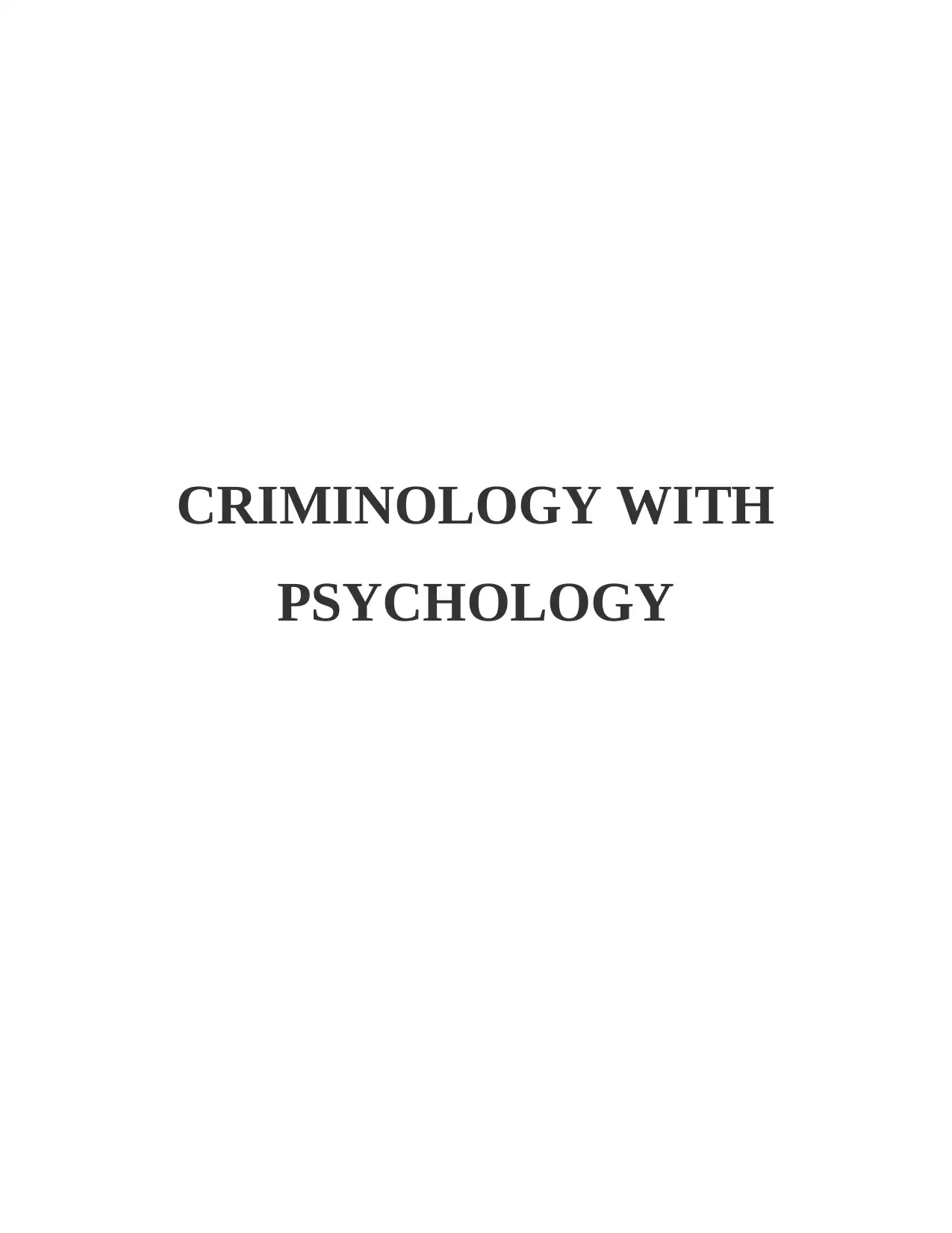
CRIMINOLOGY WITH
PSYCHOLOGY
PSYCHOLOGY
Paraphrase This Document
Need a fresh take? Get an instant paraphrase of this document with our AI Paraphraser
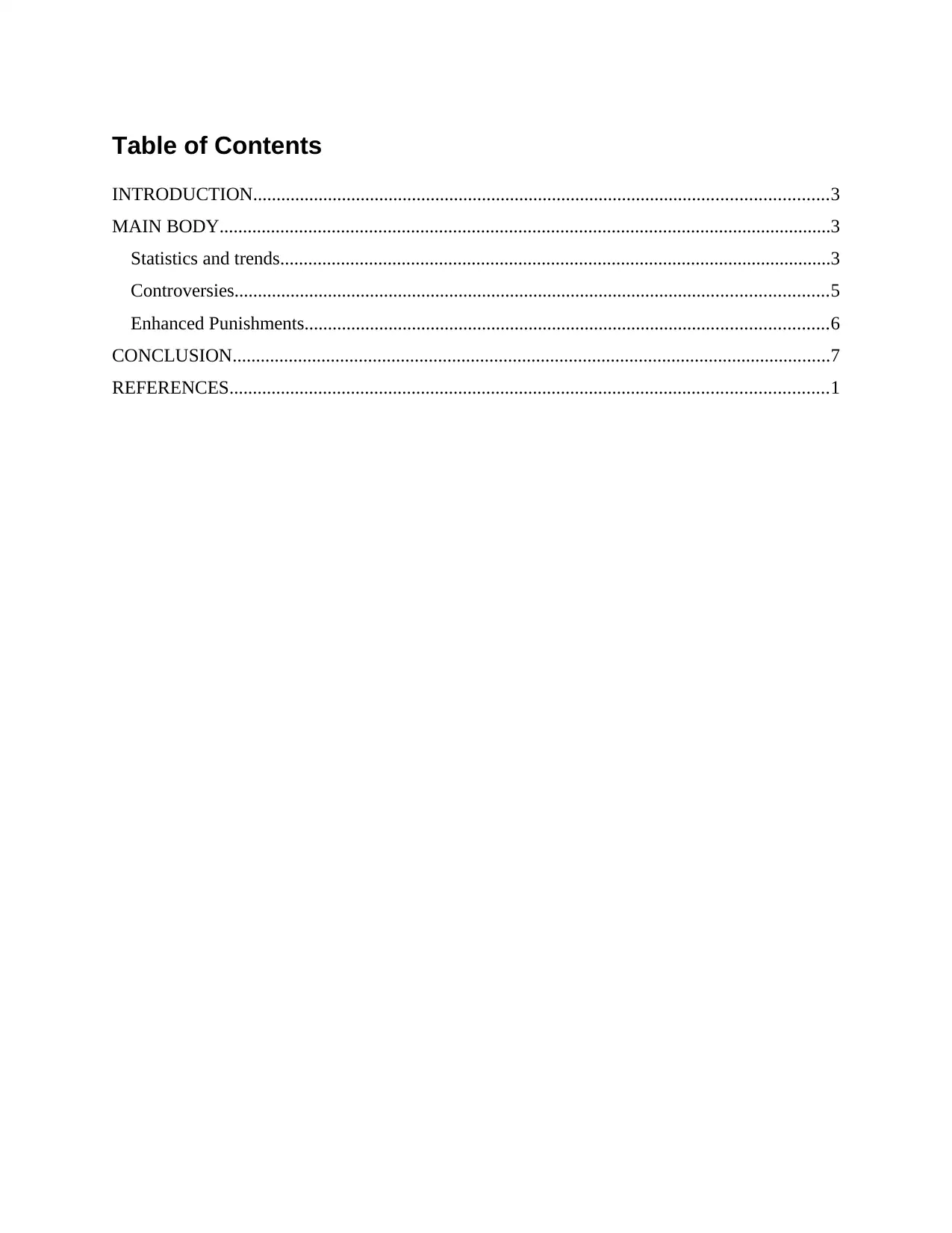
Table of Contents
INTRODUCTION...........................................................................................................................3
MAIN BODY...................................................................................................................................3
Statistics and trends......................................................................................................................3
Controversies...............................................................................................................................5
Enhanced Punishments................................................................................................................6
CONCLUSION................................................................................................................................7
REFERENCES................................................................................................................................1
INTRODUCTION...........................................................................................................................3
MAIN BODY...................................................................................................................................3
Statistics and trends......................................................................................................................3
Controversies...............................................................................................................................5
Enhanced Punishments................................................................................................................6
CONCLUSION................................................................................................................................7
REFERENCES................................................................................................................................1
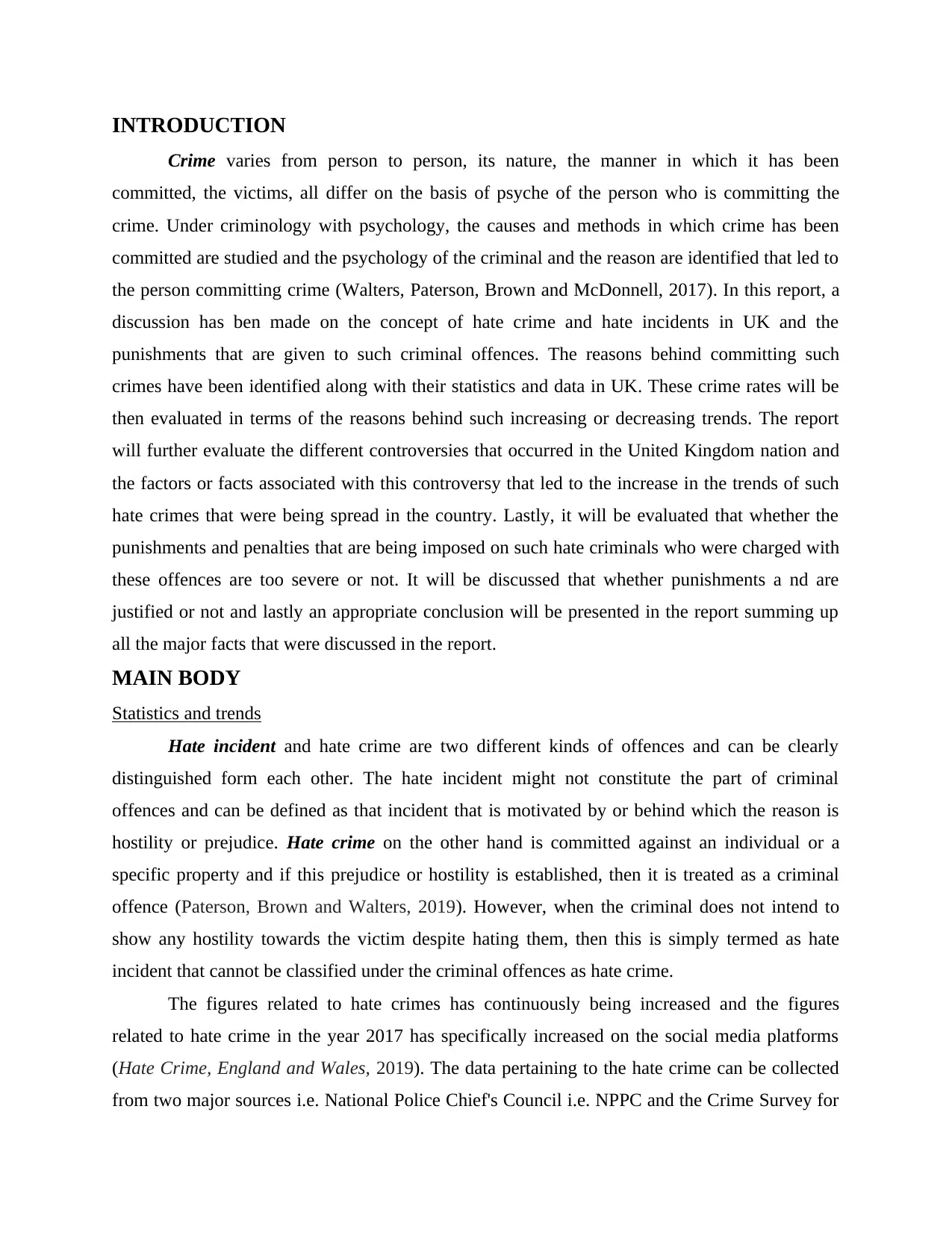
INTRODUCTION
Crime varies from person to person, its nature, the manner in which it has been
committed, the victims, all differ on the basis of psyche of the person who is committing the
crime. Under criminology with psychology, the causes and methods in which crime has been
committed are studied and the psychology of the criminal and the reason are identified that led to
the person committing crime (Walters, Paterson, Brown and McDonnell, 2017). In this report, a
discussion has ben made on the concept of hate crime and hate incidents in UK and the
punishments that are given to such criminal offences. The reasons behind committing such
crimes have been identified along with their statistics and data in UK. These crime rates will be
then evaluated in terms of the reasons behind such increasing or decreasing trends. The report
will further evaluate the different controversies that occurred in the United Kingdom nation and
the factors or facts associated with this controversy that led to the increase in the trends of such
hate crimes that were being spread in the country. Lastly, it will be evaluated that whether the
punishments and penalties that are being imposed on such hate criminals who were charged with
these offences are too severe or not. It will be discussed that whether punishments a nd are
justified or not and lastly an appropriate conclusion will be presented in the report summing up
all the major facts that were discussed in the report.
MAIN BODY
Statistics and trends
Hate incident and hate crime are two different kinds of offences and can be clearly
distinguished form each other. The hate incident might not constitute the part of criminal
offences and can be defined as that incident that is motivated by or behind which the reason is
hostility or prejudice. Hate crime on the other hand is committed against an individual or a
specific property and if this prejudice or hostility is established, then it is treated as a criminal
offence (Paterson, Brown and Walters, 2019). However, when the criminal does not intend to
show any hostility towards the victim despite hating them, then this is simply termed as hate
incident that cannot be classified under the criminal offences as hate crime.
The figures related to hate crimes has continuously being increased and the figures
related to hate crime in the year 2017 has specifically increased on the social media platforms
(Hate Crime, England and Wales, 2019). The data pertaining to the hate crime can be collected
from two major sources i.e. National Police Chief's Council i.e. NPPC and the Crime Survey for
Crime varies from person to person, its nature, the manner in which it has been
committed, the victims, all differ on the basis of psyche of the person who is committing the
crime. Under criminology with psychology, the causes and methods in which crime has been
committed are studied and the psychology of the criminal and the reason are identified that led to
the person committing crime (Walters, Paterson, Brown and McDonnell, 2017). In this report, a
discussion has ben made on the concept of hate crime and hate incidents in UK and the
punishments that are given to such criminal offences. The reasons behind committing such
crimes have been identified along with their statistics and data in UK. These crime rates will be
then evaluated in terms of the reasons behind such increasing or decreasing trends. The report
will further evaluate the different controversies that occurred in the United Kingdom nation and
the factors or facts associated with this controversy that led to the increase in the trends of such
hate crimes that were being spread in the country. Lastly, it will be evaluated that whether the
punishments and penalties that are being imposed on such hate criminals who were charged with
these offences are too severe or not. It will be discussed that whether punishments a nd are
justified or not and lastly an appropriate conclusion will be presented in the report summing up
all the major facts that were discussed in the report.
MAIN BODY
Statistics and trends
Hate incident and hate crime are two different kinds of offences and can be clearly
distinguished form each other. The hate incident might not constitute the part of criminal
offences and can be defined as that incident that is motivated by or behind which the reason is
hostility or prejudice. Hate crime on the other hand is committed against an individual or a
specific property and if this prejudice or hostility is established, then it is treated as a criminal
offence (Paterson, Brown and Walters, 2019). However, when the criminal does not intend to
show any hostility towards the victim despite hating them, then this is simply termed as hate
incident that cannot be classified under the criminal offences as hate crime.
The figures related to hate crimes has continuously being increased and the figures
related to hate crime in the year 2017 has specifically increased on the social media platforms
(Hate Crime, England and Wales, 2019). The data pertaining to the hate crime can be collected
from two major sources i.e. National Police Chief's Council i.e. NPPC and the Crime Survey for
⊘ This is a preview!⊘
Do you want full access?
Subscribe today to unlock all pages.

Trusted by 1+ million students worldwide
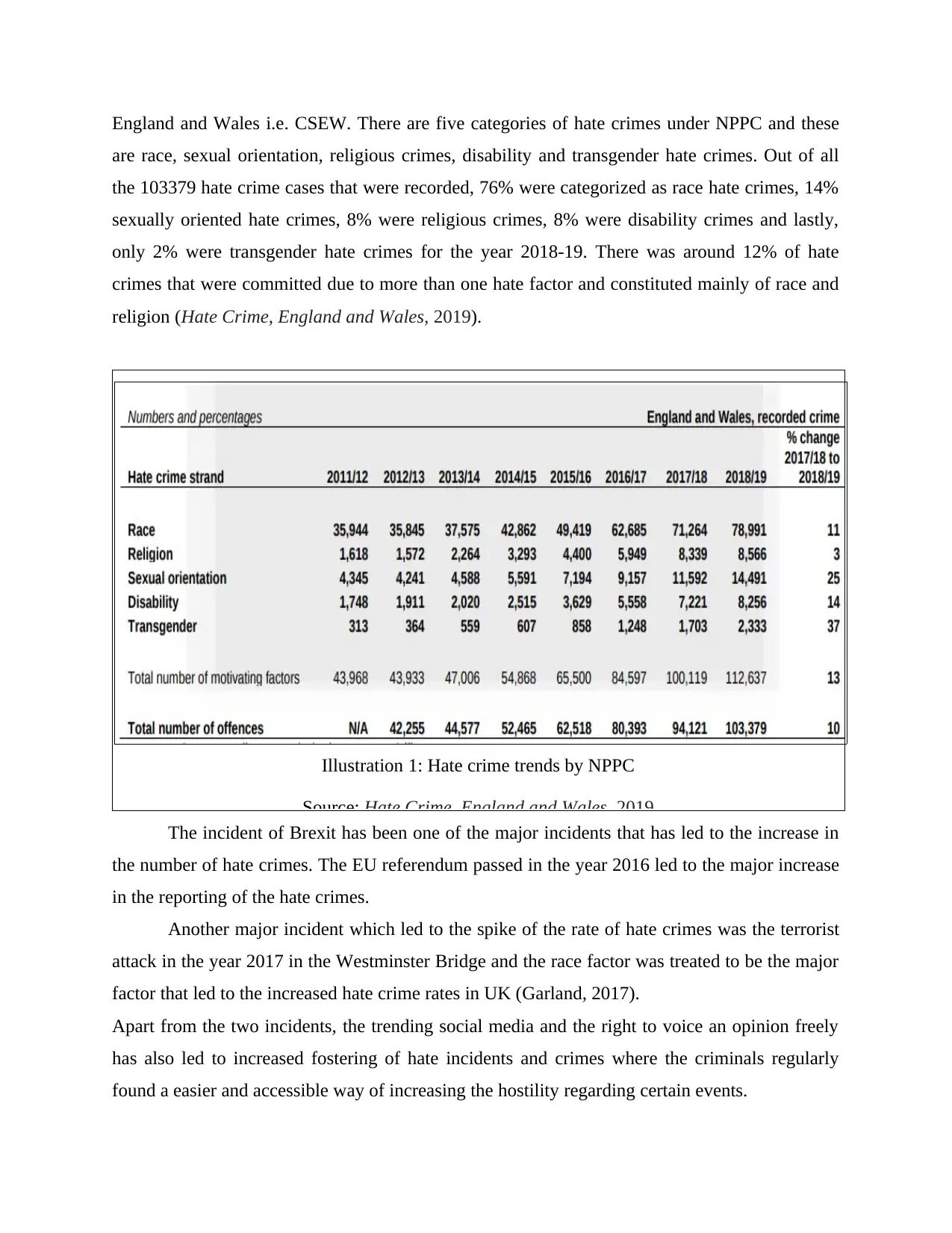
England and Wales i.e. CSEW. There are five categories of hate crimes under NPPC and these
are race, sexual orientation, religious crimes, disability and transgender hate crimes. Out of all
the 103379 hate crime cases that were recorded, 76% were categorized as race hate crimes, 14%
sexually oriented hate crimes, 8% were religious crimes, 8% were disability crimes and lastly,
only 2% were transgender hate crimes for the year 2018-19. There was around 12% of hate
crimes that were committed due to more than one hate factor and constituted mainly of race and
religion (Hate Crime, England and Wales, 2019).
The incident of Brexit has been one of the major incidents that has led to the increase in
the number of hate crimes. The EU referendum passed in the year 2016 led to the major increase
in the reporting of the hate crimes.
Another major incident which led to the spike of the rate of hate crimes was the terrorist
attack in the year 2017 in the Westminster Bridge and the race factor was treated to be the major
factor that led to the increased hate crime rates in UK (Garland, 2017).
Apart from the two incidents, the trending social media and the right to voice an opinion freely
has also led to increased fostering of hate incidents and crimes where the criminals regularly
found a easier and accessible way of increasing the hostility regarding certain events.
Illustration 1: Hate crime trends by NPPC
Source: Hate Crime, England and Wales, 2019
are race, sexual orientation, religious crimes, disability and transgender hate crimes. Out of all
the 103379 hate crime cases that were recorded, 76% were categorized as race hate crimes, 14%
sexually oriented hate crimes, 8% were religious crimes, 8% were disability crimes and lastly,
only 2% were transgender hate crimes for the year 2018-19. There was around 12% of hate
crimes that were committed due to more than one hate factor and constituted mainly of race and
religion (Hate Crime, England and Wales, 2019).
The incident of Brexit has been one of the major incidents that has led to the increase in
the number of hate crimes. The EU referendum passed in the year 2016 led to the major increase
in the reporting of the hate crimes.
Another major incident which led to the spike of the rate of hate crimes was the terrorist
attack in the year 2017 in the Westminster Bridge and the race factor was treated to be the major
factor that led to the increased hate crime rates in UK (Garland, 2017).
Apart from the two incidents, the trending social media and the right to voice an opinion freely
has also led to increased fostering of hate incidents and crimes where the criminals regularly
found a easier and accessible way of increasing the hostility regarding certain events.
Illustration 1: Hate crime trends by NPPC
Source: Hate Crime, England and Wales, 2019
Paraphrase This Document
Need a fresh take? Get an instant paraphrase of this document with our AI Paraphraser
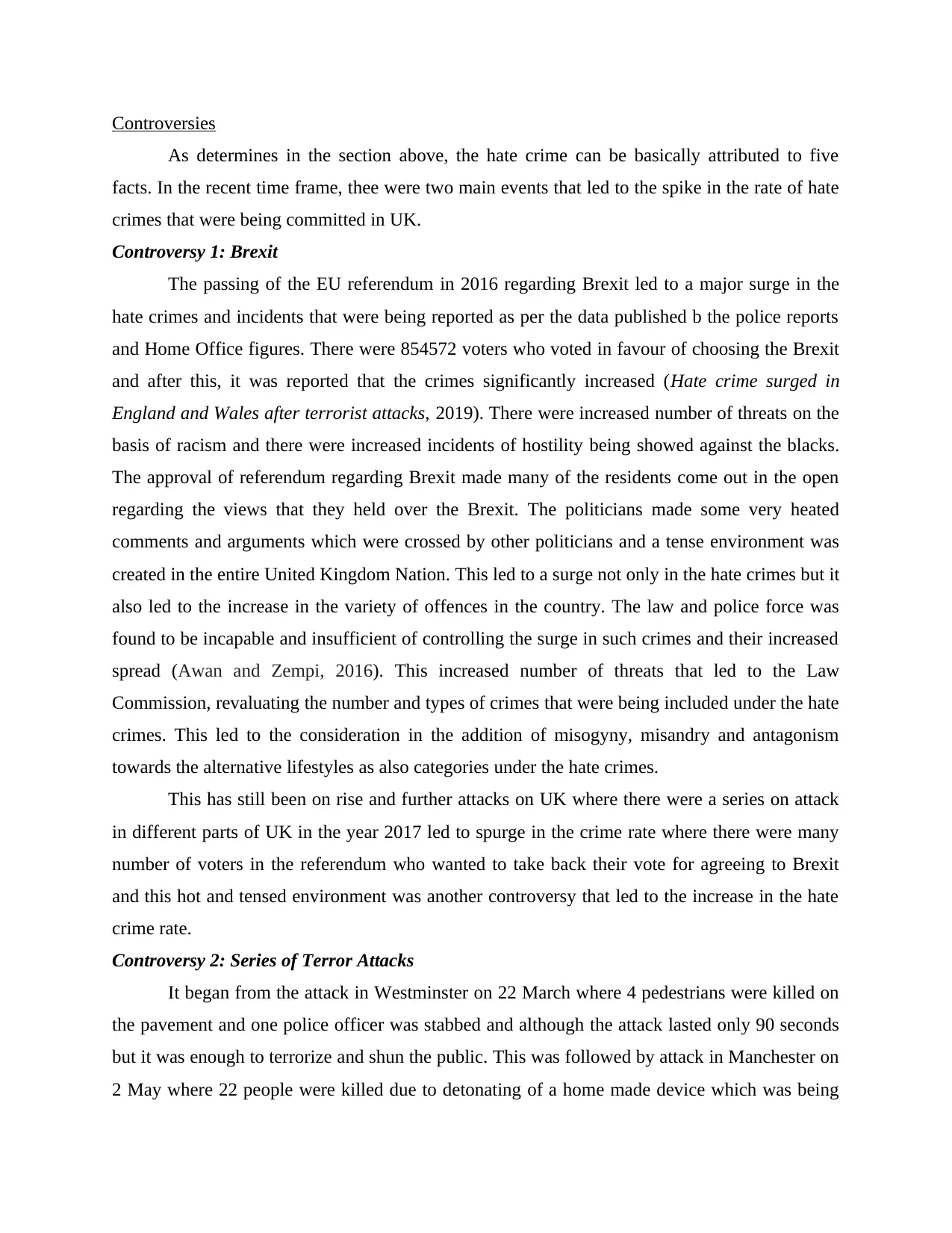
Controversies
As determines in the section above, the hate crime can be basically attributed to five
facts. In the recent time frame, thee were two main events that led to the spike in the rate of hate
crimes that were being committed in UK.
Controversy 1: Brexit
The passing of the EU referendum in 2016 regarding Brexit led to a major surge in the
hate crimes and incidents that were being reported as per the data published b the police reports
and Home Office figures. There were 854572 voters who voted in favour of choosing the Brexit
and after this, it was reported that the crimes significantly increased (Hate crime surged in
England and Wales after terrorist attacks, 2019). There were increased number of threats on the
basis of racism and there were increased incidents of hostility being showed against the blacks.
The approval of referendum regarding Brexit made many of the residents come out in the open
regarding the views that they held over the Brexit. The politicians made some very heated
comments and arguments which were crossed by other politicians and a tense environment was
created in the entire United Kingdom Nation. This led to a surge not only in the hate crimes but it
also led to the increase in the variety of offences in the country. The law and police force was
found to be incapable and insufficient of controlling the surge in such crimes and their increased
spread (Awan and Zempi, 2016). This increased number of threats that led to the Law
Commission, revaluating the number and types of crimes that were being included under the hate
crimes. This led to the consideration in the addition of misogyny, misandry and antagonism
towards the alternative lifestyles as also categories under the hate crimes.
This has still been on rise and further attacks on UK where there were a series on attack
in different parts of UK in the year 2017 led to spurge in the crime rate where there were many
number of voters in the referendum who wanted to take back their vote for agreeing to Brexit
and this hot and tensed environment was another controversy that led to the increase in the hate
crime rate.
Controversy 2: Series of Terror Attacks
It began from the attack in Westminster on 22 March where 4 pedestrians were killed on
the pavement and one police officer was stabbed and although the attack lasted only 90 seconds
but it was enough to terrorize and shun the public. This was followed by attack in Manchester on
2 May where 22 people were killed due to detonating of a home made device which was being
As determines in the section above, the hate crime can be basically attributed to five
facts. In the recent time frame, thee were two main events that led to the spike in the rate of hate
crimes that were being committed in UK.
Controversy 1: Brexit
The passing of the EU referendum in 2016 regarding Brexit led to a major surge in the
hate crimes and incidents that were being reported as per the data published b the police reports
and Home Office figures. There were 854572 voters who voted in favour of choosing the Brexit
and after this, it was reported that the crimes significantly increased (Hate crime surged in
England and Wales after terrorist attacks, 2019). There were increased number of threats on the
basis of racism and there were increased incidents of hostility being showed against the blacks.
The approval of referendum regarding Brexit made many of the residents come out in the open
regarding the views that they held over the Brexit. The politicians made some very heated
comments and arguments which were crossed by other politicians and a tense environment was
created in the entire United Kingdom Nation. This led to a surge not only in the hate crimes but it
also led to the increase in the variety of offences in the country. The law and police force was
found to be incapable and insufficient of controlling the surge in such crimes and their increased
spread (Awan and Zempi, 2016). This increased number of threats that led to the Law
Commission, revaluating the number and types of crimes that were being included under the hate
crimes. This led to the consideration in the addition of misogyny, misandry and antagonism
towards the alternative lifestyles as also categories under the hate crimes.
This has still been on rise and further attacks on UK where there were a series on attack
in different parts of UK in the year 2017 led to spurge in the crime rate where there were many
number of voters in the referendum who wanted to take back their vote for agreeing to Brexit
and this hot and tensed environment was another controversy that led to the increase in the hate
crime rate.
Controversy 2: Series of Terror Attacks
It began from the attack in Westminster on 22 March where 4 pedestrians were killed on
the pavement and one police officer was stabbed and although the attack lasted only 90 seconds
but it was enough to terrorize and shun the public. This was followed by attack in Manchester on
2 May where 22 people were killed due to detonating of a home made device which was being
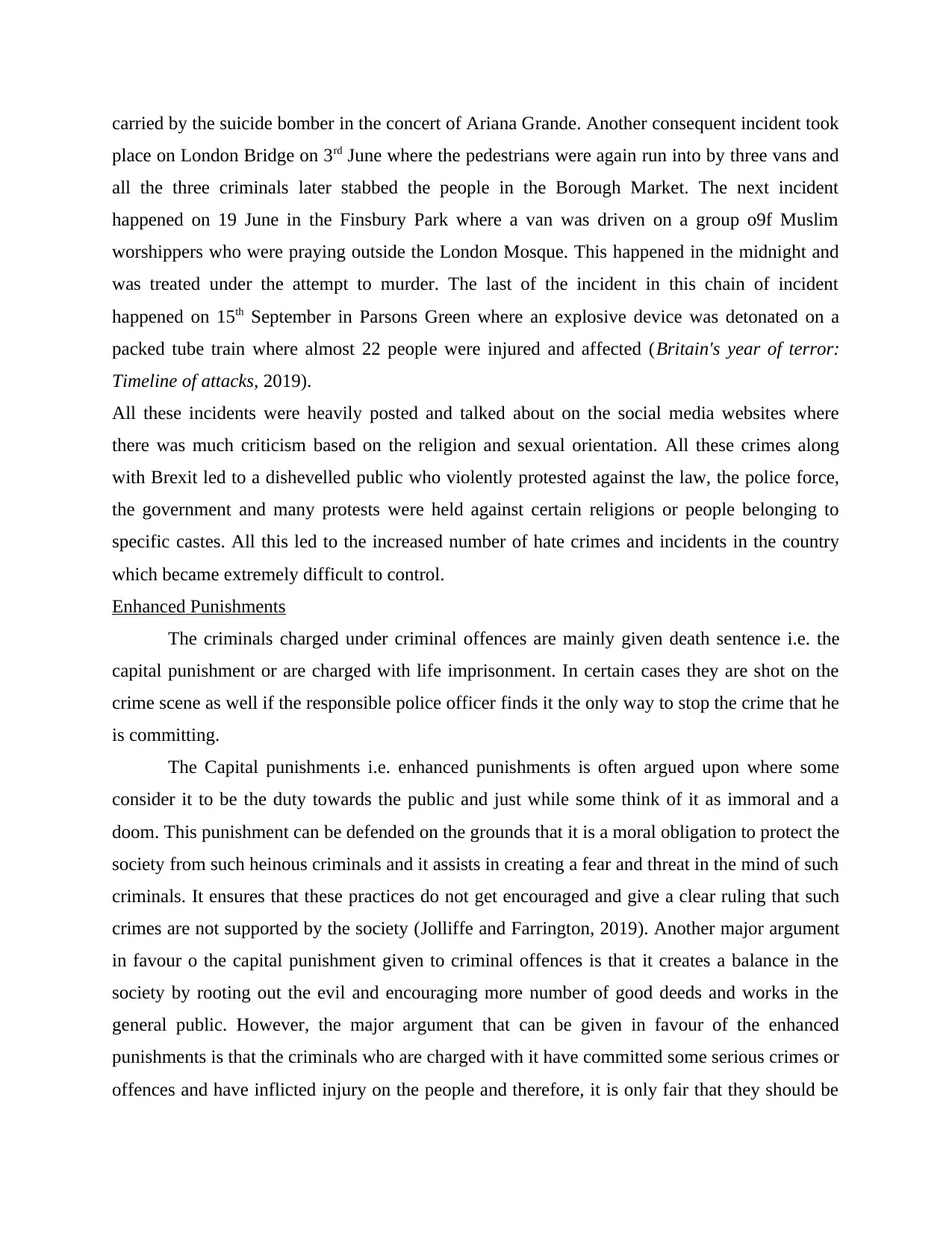
carried by the suicide bomber in the concert of Ariana Grande. Another consequent incident took
place on London Bridge on 3rd June where the pedestrians were again run into by three vans and
all the three criminals later stabbed the people in the Borough Market. The next incident
happened on 19 June in the Finsbury Park where a van was driven on a group o9f Muslim
worshippers who were praying outside the London Mosque. This happened in the midnight and
was treated under the attempt to murder. The last of the incident in this chain of incident
happened on 15th September in Parsons Green where an explosive device was detonated on a
packed tube train where almost 22 people were injured and affected (Britain's year of terror:
Timeline of attacks, 2019).
All these incidents were heavily posted and talked about on the social media websites where
there was much criticism based on the religion and sexual orientation. All these crimes along
with Brexit led to a dishevelled public who violently protested against the law, the police force,
the government and many protests were held against certain religions or people belonging to
specific castes. All this led to the increased number of hate crimes and incidents in the country
which became extremely difficult to control.
Enhanced Punishments
The criminals charged under criminal offences are mainly given death sentence i.e. the
capital punishment or are charged with life imprisonment. In certain cases they are shot on the
crime scene as well if the responsible police officer finds it the only way to stop the crime that he
is committing.
The Capital punishments i.e. enhanced punishments is often argued upon where some
consider it to be the duty towards the public and just while some think of it as immoral and a
doom. This punishment can be defended on the grounds that it is a moral obligation to protect the
society from such heinous criminals and it assists in creating a fear and threat in the mind of such
criminals. It ensures that these practices do not get encouraged and give a clear ruling that such
crimes are not supported by the society (Jolliffe and Farrington, 2019). Another major argument
in favour o the capital punishment given to criminal offences is that it creates a balance in the
society by rooting out the evil and encouraging more number of good deeds and works in the
general public. However, the major argument that can be given in favour of the enhanced
punishments is that the criminals who are charged with it have committed some serious crimes or
offences and have inflicted injury on the people and therefore, it is only fair that they should be
place on London Bridge on 3rd June where the pedestrians were again run into by three vans and
all the three criminals later stabbed the people in the Borough Market. The next incident
happened on 19 June in the Finsbury Park where a van was driven on a group o9f Muslim
worshippers who were praying outside the London Mosque. This happened in the midnight and
was treated under the attempt to murder. The last of the incident in this chain of incident
happened on 15th September in Parsons Green where an explosive device was detonated on a
packed tube train where almost 22 people were injured and affected (Britain's year of terror:
Timeline of attacks, 2019).
All these incidents were heavily posted and talked about on the social media websites where
there was much criticism based on the religion and sexual orientation. All these crimes along
with Brexit led to a dishevelled public who violently protested against the law, the police force,
the government and many protests were held against certain religions or people belonging to
specific castes. All this led to the increased number of hate crimes and incidents in the country
which became extremely difficult to control.
Enhanced Punishments
The criminals charged under criminal offences are mainly given death sentence i.e. the
capital punishment or are charged with life imprisonment. In certain cases they are shot on the
crime scene as well if the responsible police officer finds it the only way to stop the crime that he
is committing.
The Capital punishments i.e. enhanced punishments is often argued upon where some
consider it to be the duty towards the public and just while some think of it as immoral and a
doom. This punishment can be defended on the grounds that it is a moral obligation to protect the
society from such heinous criminals and it assists in creating a fear and threat in the mind of such
criminals. It ensures that these practices do not get encouraged and give a clear ruling that such
crimes are not supported by the society (Jolliffe and Farrington, 2019). Another major argument
in favour o the capital punishment given to criminal offences is that it creates a balance in the
society by rooting out the evil and encouraging more number of good deeds and works in the
general public. However, the major argument that can be given in favour of the enhanced
punishments is that the criminals who are charged with it have committed some serious crimes or
offences and have inflicted injury on the people and therefore, it is only fair that they should be
⊘ This is a preview!⊘
Do you want full access?
Subscribe today to unlock all pages.

Trusted by 1+ million students worldwide
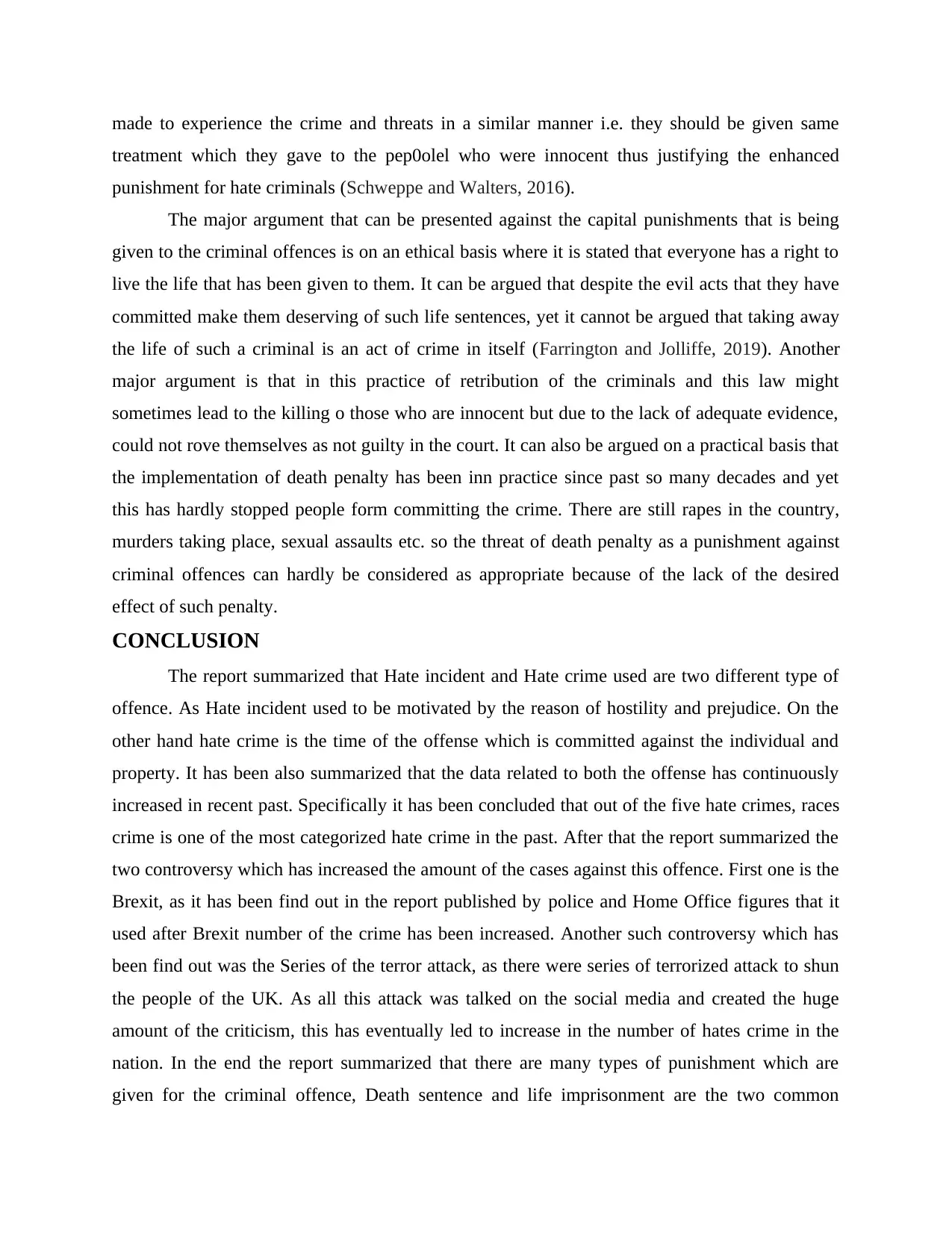
made to experience the crime and threats in a similar manner i.e. they should be given same
treatment which they gave to the pep0olel who were innocent thus justifying the enhanced
punishment for hate criminals (Schweppe and Walters, 2016).
The major argument that can be presented against the capital punishments that is being
given to the criminal offences is on an ethical basis where it is stated that everyone has a right to
live the life that has been given to them. It can be argued that despite the evil acts that they have
committed make them deserving of such life sentences, yet it cannot be argued that taking away
the life of such a criminal is an act of crime in itself (Farrington and Jolliffe, 2019). Another
major argument is that in this practice of retribution of the criminals and this law might
sometimes lead to the killing o those who are innocent but due to the lack of adequate evidence,
could not rove themselves as not guilty in the court. It can also be argued on a practical basis that
the implementation of death penalty has been inn practice since past so many decades and yet
this has hardly stopped people form committing the crime. There are still rapes in the country,
murders taking place, sexual assaults etc. so the threat of death penalty as a punishment against
criminal offences can hardly be considered as appropriate because of the lack of the desired
effect of such penalty.
CONCLUSION
The report summarized that Hate incident and Hate crime used are two different type of
offence. As Hate incident used to be motivated by the reason of hostility and prejudice. On the
other hand hate crime is the time of the offense which is committed against the individual and
property. It has been also summarized that the data related to both the offense has continuously
increased in recent past. Specifically it has been concluded that out of the five hate crimes, races
crime is one of the most categorized hate crime in the past. After that the report summarized the
two controversy which has increased the amount of the cases against this offence. First one is the
Brexit, as it has been find out in the report published by police and Home Office figures that it
used after Brexit number of the crime has been increased. Another such controversy which has
been find out was the Series of the terror attack, as there were series of terrorized attack to shun
the people of the UK. As all this attack was talked on the social media and created the huge
amount of the criticism, this has eventually led to increase in the number of hates crime in the
nation. In the end the report summarized that there are many types of punishment which are
given for the criminal offence, Death sentence and life imprisonment are the two common
treatment which they gave to the pep0olel who were innocent thus justifying the enhanced
punishment for hate criminals (Schweppe and Walters, 2016).
The major argument that can be presented against the capital punishments that is being
given to the criminal offences is on an ethical basis where it is stated that everyone has a right to
live the life that has been given to them. It can be argued that despite the evil acts that they have
committed make them deserving of such life sentences, yet it cannot be argued that taking away
the life of such a criminal is an act of crime in itself (Farrington and Jolliffe, 2019). Another
major argument is that in this practice of retribution of the criminals and this law might
sometimes lead to the killing o those who are innocent but due to the lack of adequate evidence,
could not rove themselves as not guilty in the court. It can also be argued on a practical basis that
the implementation of death penalty has been inn practice since past so many decades and yet
this has hardly stopped people form committing the crime. There are still rapes in the country,
murders taking place, sexual assaults etc. so the threat of death penalty as a punishment against
criminal offences can hardly be considered as appropriate because of the lack of the desired
effect of such penalty.
CONCLUSION
The report summarized that Hate incident and Hate crime used are two different type of
offence. As Hate incident used to be motivated by the reason of hostility and prejudice. On the
other hand hate crime is the time of the offense which is committed against the individual and
property. It has been also summarized that the data related to both the offense has continuously
increased in recent past. Specifically it has been concluded that out of the five hate crimes, races
crime is one of the most categorized hate crime in the past. After that the report summarized the
two controversy which has increased the amount of the cases against this offence. First one is the
Brexit, as it has been find out in the report published by police and Home Office figures that it
used after Brexit number of the crime has been increased. Another such controversy which has
been find out was the Series of the terror attack, as there were series of terrorized attack to shun
the people of the UK. As all this attack was talked on the social media and created the huge
amount of the criticism, this has eventually led to increase in the number of hates crime in the
nation. In the end the report summarized that there are many types of punishment which are
given for the criminal offence, Death sentence and life imprisonment are the two common
Paraphrase This Document
Need a fresh take? Get an instant paraphrase of this document with our AI Paraphraser

punishment which are handed for the offence. There is good sort of argument which has been
already made on it as some critics are having thought that everyone has a right to life, at the same
time some critics are against it.
already made on it as some critics are having thought that everyone has a right to life, at the same
time some critics are against it.
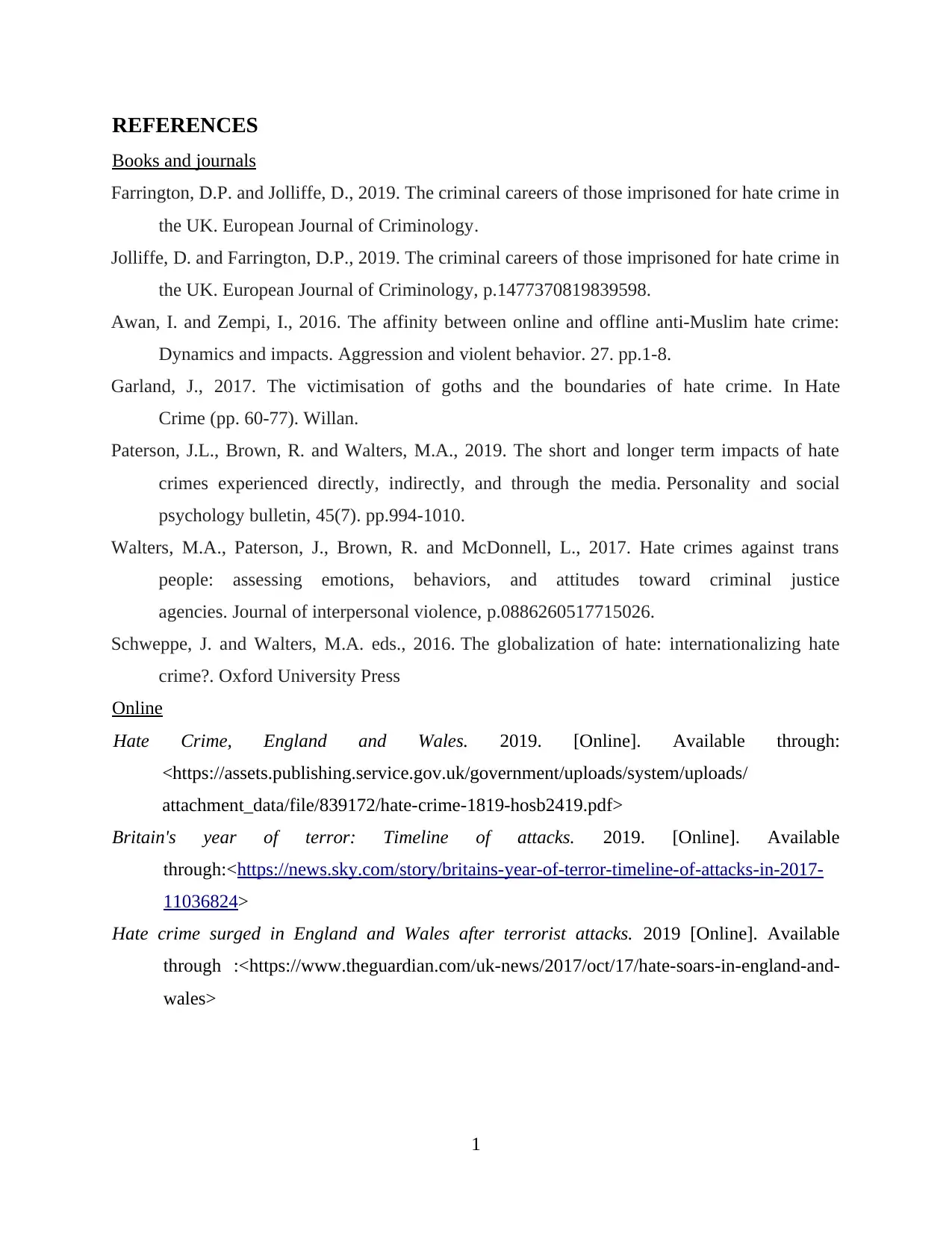
REFERENCES
Books and journals
Farrington, D.P. and Jolliffe, D., 2019. The criminal careers of those imprisoned for hate crime in
the UK. European Journal of Criminology.
Jolliffe, D. and Farrington, D.P., 2019. The criminal careers of those imprisoned for hate crime in
the UK. European Journal of Criminology, p.1477370819839598.
Awan, I. and Zempi, I., 2016. The affinity between online and offline anti-Muslim hate crime:
Dynamics and impacts. Aggression and violent behavior. 27. pp.1-8.
Garland, J., 2017. The victimisation of goths and the boundaries of hate crime. In Hate
Crime (pp. 60-77). Willan.
Paterson, J.L., Brown, R. and Walters, M.A., 2019. The short and longer term impacts of hate
crimes experienced directly, indirectly, and through the media. Personality and social
psychology bulletin, 45(7). pp.994-1010.
Walters, M.A., Paterson, J., Brown, R. and McDonnell, L., 2017. Hate crimes against trans
people: assessing emotions, behaviors, and attitudes toward criminal justice
agencies. Journal of interpersonal violence, p.0886260517715026.
Schweppe, J. and Walters, M.A. eds., 2016. The globalization of hate: internationalizing hate
crime?. Oxford University Press
Online
Hate Crime, England and Wales. 2019. [Online]. Available through:
<https://assets.publishing.service.gov.uk/government/uploads/system/uploads/
attachment_data/file/839172/hate-crime-1819-hosb2419.pdf>
Britain's year of terror: Timeline of attacks. 2019. [Online]. Available
through:<https://news.sky.com/story/britains-year-of-terror-timeline-of-attacks-in-2017-
11036824>
Hate crime surged in England and Wales after terrorist attacks. 2019 [Online]. Available
through :<https://www.theguardian.com/uk-news/2017/oct/17/hate-soars-in-england-and-
wales>
1
Books and journals
Farrington, D.P. and Jolliffe, D., 2019. The criminal careers of those imprisoned for hate crime in
the UK. European Journal of Criminology.
Jolliffe, D. and Farrington, D.P., 2019. The criminal careers of those imprisoned for hate crime in
the UK. European Journal of Criminology, p.1477370819839598.
Awan, I. and Zempi, I., 2016. The affinity between online and offline anti-Muslim hate crime:
Dynamics and impacts. Aggression and violent behavior. 27. pp.1-8.
Garland, J., 2017. The victimisation of goths and the boundaries of hate crime. In Hate
Crime (pp. 60-77). Willan.
Paterson, J.L., Brown, R. and Walters, M.A., 2019. The short and longer term impacts of hate
crimes experienced directly, indirectly, and through the media. Personality and social
psychology bulletin, 45(7). pp.994-1010.
Walters, M.A., Paterson, J., Brown, R. and McDonnell, L., 2017. Hate crimes against trans
people: assessing emotions, behaviors, and attitudes toward criminal justice
agencies. Journal of interpersonal violence, p.0886260517715026.
Schweppe, J. and Walters, M.A. eds., 2016. The globalization of hate: internationalizing hate
crime?. Oxford University Press
Online
Hate Crime, England and Wales. 2019. [Online]. Available through:
<https://assets.publishing.service.gov.uk/government/uploads/system/uploads/
attachment_data/file/839172/hate-crime-1819-hosb2419.pdf>
Britain's year of terror: Timeline of attacks. 2019. [Online]. Available
through:<https://news.sky.com/story/britains-year-of-terror-timeline-of-attacks-in-2017-
11036824>
Hate crime surged in England and Wales after terrorist attacks. 2019 [Online]. Available
through :<https://www.theguardian.com/uk-news/2017/oct/17/hate-soars-in-england-and-
wales>
1
⊘ This is a preview!⊘
Do you want full access?
Subscribe today to unlock all pages.

Trusted by 1+ million students worldwide

2
1 out of 10
Related Documents
Your All-in-One AI-Powered Toolkit for Academic Success.
+13062052269
info@desklib.com
Available 24*7 on WhatsApp / Email
![[object Object]](/_next/static/media/star-bottom.7253800d.svg)
Unlock your academic potential
Copyright © 2020–2026 A2Z Services. All Rights Reserved. Developed and managed by ZUCOL.





